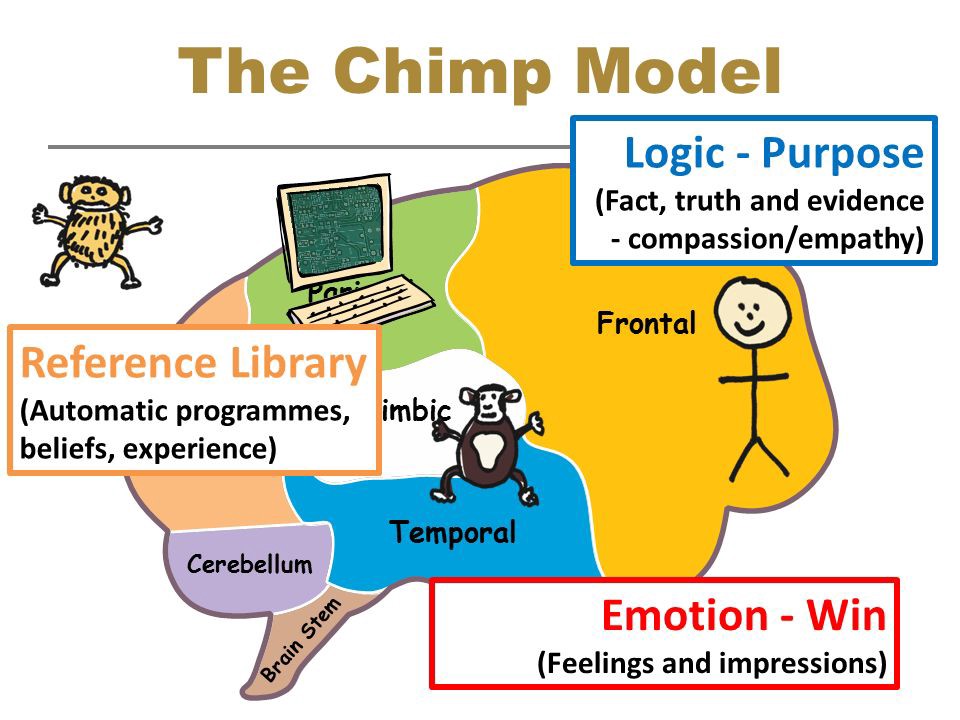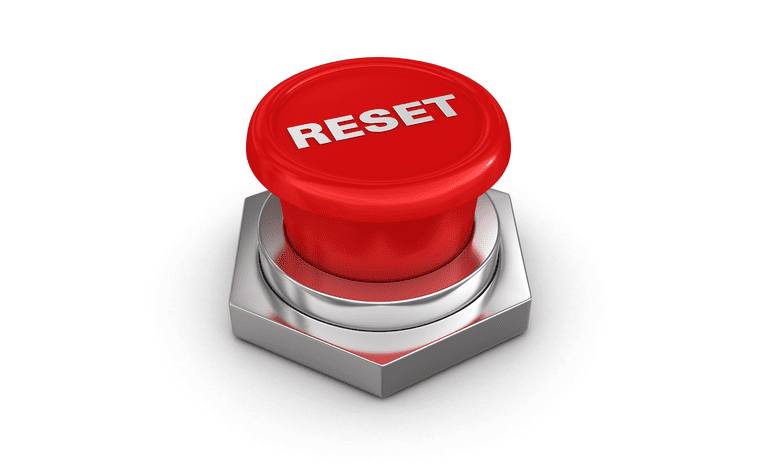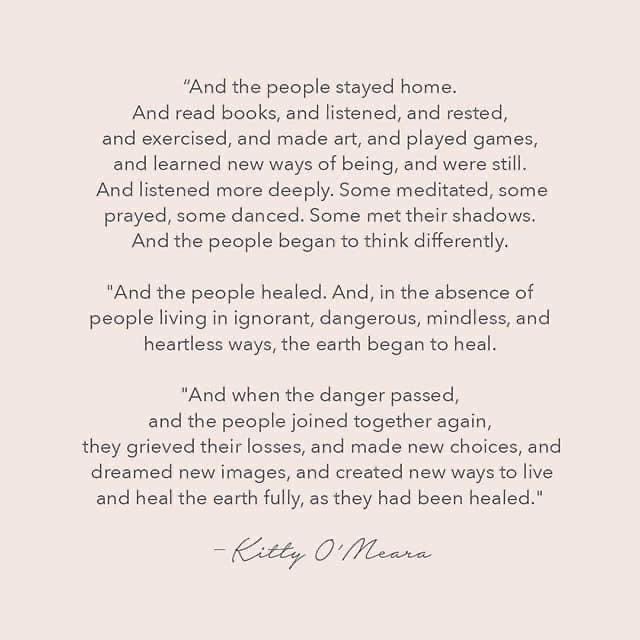 Prof Steve Peters, renowned psychiatrist, (particularly for his work with Sports teams) has written a brilliant book called ‘The Chimp Paradox’, which I regularly recommend to my patients. It’s well worth the read and full of helpful and practical tools to enable effective mindset and behaviour change. In it, he teaches about the 3 main parts of the brain when it comes to our habitual behaviours – what he calls The Chimp (Limbic System – where we make our immediate responses – based on our feelings and impressions), The Computer (the parietal cortex, which stores our automatic programmes and responses based on our beliefs and experiences) and The Human (the frontal cortex, where we do our thinking and make more conscious choices based on fact, truth
Prof Steve Peters, renowned psychiatrist, (particularly for his work with Sports teams) has written a brilliant book called ‘The Chimp Paradox’, which I regularly recommend to my patients. It’s well worth the read and full of helpful and practical tools to enable effective mindset and behaviour change. In it, he teaches about the 3 main parts of the brain when it comes to our habitual behaviours – what he calls The Chimp (Limbic System – where we make our immediate responses – based on our feelings and impressions), The Computer (the parietal cortex, which stores our automatic programmes and responses based on our beliefs and experiences) and The Human (the frontal cortex, where we do our thinking and make more conscious choices based on fact, truth and evidence, usually from a place of compassion and empathy). Many times we find ourselves acting in ways which are simply responses of our chimp brain – we’re not being guided by conscious choices or values, or even if we want to, we can’t seem to overcome the strength of our chimp. The problem is that our chimp is 5x faster than our human brain. And if we also have ingrained trauma-based responses to certain situations, when we are triggered (e.g. when we feel scared or lonely or whatever), our chimp gets ready to act, checks its facts with the computer which agrees that this is how it should/would usually respond and a bar of chocolate later……. Same old cycle, same old shame…..
and evidence, usually from a place of compassion and empathy). Many times we find ourselves acting in ways which are simply responses of our chimp brain – we’re not being guided by conscious choices or values, or even if we want to, we can’t seem to overcome the strength of our chimp. The problem is that our chimp is 5x faster than our human brain. And if we also have ingrained trauma-based responses to certain situations, when we are triggered (e.g. when we feel scared or lonely or whatever), our chimp gets ready to act, checks its facts with the computer which agrees that this is how it should/would usually respond and a bar of chocolate later……. Same old cycle, same old shame…..
So how can we change these patterns? Well, we need to feed our computer brain some new messages, so that when the chimp starts acting out and checks in with the computer, the computer no longer agrees with that old way of reacting, puts a pause on the chimp and allows the human brain to kick in with more positive choices. This happens, by consciously renewing your mind by feeding your mind your core truths and values. When you fill your mind with what you know to be true and the values you want to live by, you begin to make different choices. Your computer begins to store new and different information and therefore when your Chimp begins to act out, it will check in with your computer and find that the automatic affirmation of a learned behaviour can begin to change. This has huge implications in how we think about ‘taking responsibility’ and managing our own behavioural choices. I also think it has a wider application to our corporate mindsets and behaviours which cause us to continue acting in certain ways in society (which I will come onto later).
So, I have some core truths and core values which my lovely wife has painted on a board in my office. I have them written in my notebook, and (now less then I used to – to begin with it was at least twice a day) I remind myself of them regularly.
Here are the Truths that I live by:
1) I am unconditionally loved by the community of God (who unconditionally loves everyone and in whom we live, move and have our being), my wife and a bunch of other people
2) I am seen and accepted for who I am
3) Being a husband and a father are more important than any status I can ever achieve in work
4) It’s OK to make mistakes – in fact, failure is a gift
5) I can’t do everything – limits are important and so are teams!
6) Life is not always easy and happy, in fact it is unfair and really sucks at times – pain is part of the journey
7) People may not always deserve love and may not be easy to love, but you can still choose to love them – even your enemy
8) Forgiveness is a choice and it sets you and the other person free
Here are my Values:
Love people unconditionally
Walk with humility and integrity
Listen with kind eyes
Seek first to understand
Encourage and Forgive others and yourself
Act gently
Live generously with extravagant hospitality
Be open, honest and vulnerable
Leak joy
Release healing and hope
Walk in peace
Be faithful
Speak truth with compassion
Embrace pain
If you don’t know what is true and you don’t know what your values are, you cannot line up your behaviours to match them. If every time I experience pain, in whatever form that may take, I need to find comfort in a self-destructive behaviour, I have lost sight of my truths that I am unconditionally loved, that life sucks sometimes and have let go of my value to embrace pain. However, if I accept that I mess up sometimes. then I can forgive myself, and get back on track. It doesn’t have to mean a downwards slide. This is how change happens – slowly, but encouragingly as I learn to focus on who I am becoming, rather than believing I will never break out of unhelpful habits.
 In her brilliant book, ‘The Value of Everything’ in which she talks about an Economics of Hope (how good is that?!), Mariana Mazzucato applies some of this thinking into the realm of how we build a society based on our values. What if we broke out of some of our self-defeating societal norms and built our economy from the best of our compassionate values? I wonder how many of our corporate chimp-computer agreed behaviours might change if we really examined what we value when it comes to the way we build society, through our economics and politics. So much of the time we are sleep walking with our eyes wide shut to the mindsets we unconsciously imbibe, which shape our corporate behaviours and choices. How often do we examine our core values or the truths that we live by? It takes determined effort to demolish strongholds set up in our minds and replace them with a renewed set of values with which we can build a more loving and kinder world. What would this mean for health inequalities, poverty, and who or what we might choose to prioritise? Without this work, however, we will continue to behave in ways which tolerate huge social injustice and climate destruction. But things do not have to remain as they are. We can change! Hold onto hope! In this apocalyptic moment, in which we are seeing the realities behind the facades more clearly than for many years, it remains time to rest, reflect, reimagine and reset.
In her brilliant book, ‘The Value of Everything’ in which she talks about an Economics of Hope (how good is that?!), Mariana Mazzucato applies some of this thinking into the realm of how we build a society based on our values. What if we broke out of some of our self-defeating societal norms and built our economy from the best of our compassionate values? I wonder how many of our corporate chimp-computer agreed behaviours might change if we really examined what we value when it comes to the way we build society, through our economics and politics. So much of the time we are sleep walking with our eyes wide shut to the mindsets we unconsciously imbibe, which shape our corporate behaviours and choices. How often do we examine our core values or the truths that we live by? It takes determined effort to demolish strongholds set up in our minds and replace them with a renewed set of values with which we can build a more loving and kinder world. What would this mean for health inequalities, poverty, and who or what we might choose to prioritise? Without this work, however, we will continue to behave in ways which tolerate huge social injustice and climate destruction. But things do not have to remain as they are. We can change! Hold onto hope! In this apocalyptic moment, in which we are seeing the realities behind the facades more clearly than for many years, it remains time to rest, reflect, reimagine and reset.





